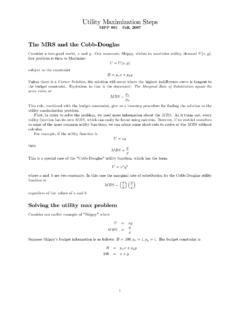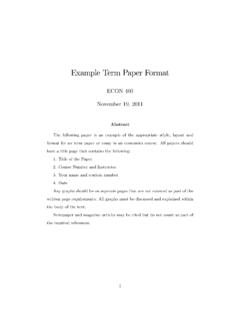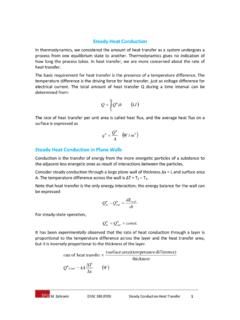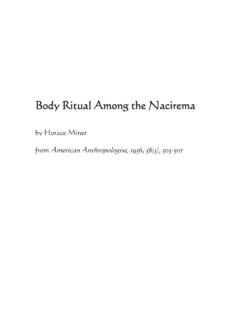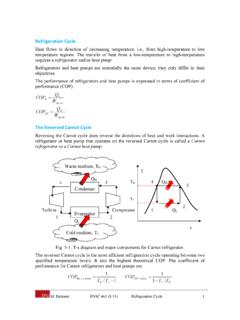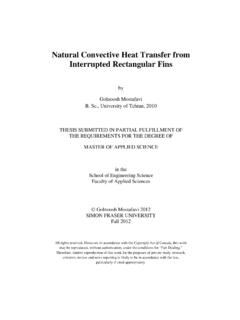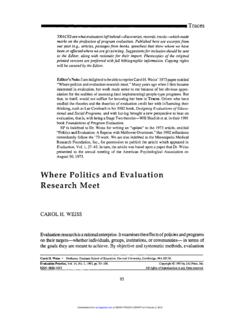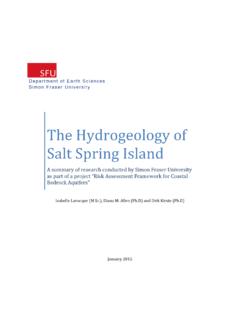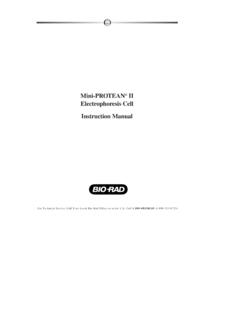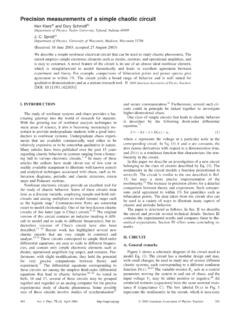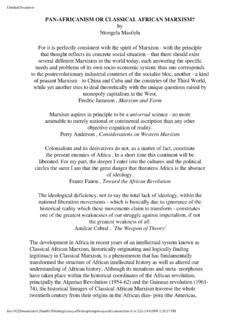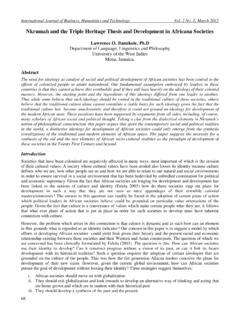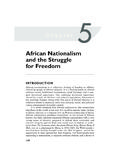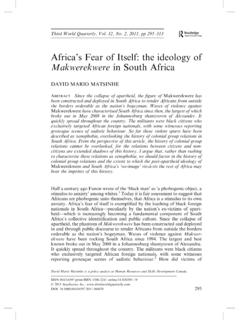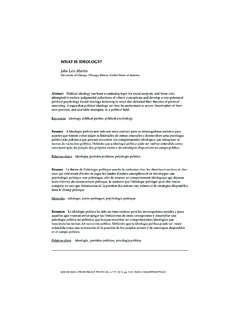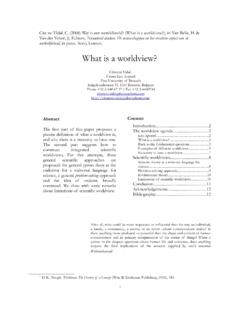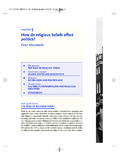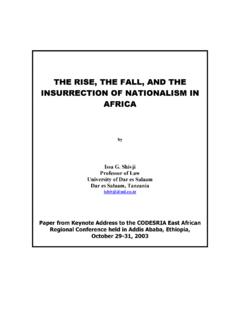Transcription of IDEOLOGY, RACISM, AND CRITICAL SOCIAL THEORY
1 153 ideology , racism , AND CRITICAL SOCIAL THEORYTOMMIE SHELBYTHE PHILOSOPHICAL FORUMV olume XXXIV, No. 2, Summer 2003 Criticism has plucked the imaginary flowers from the chain, not in order that man shall bear thechain without caprice or consolation but so that he shall cast off the chain and pluck the livingflower. Karl Marx1 The problem of the future world is the charting, by means of intelligent reason, of a path not simplythrough the resistances of physical force, but through the vaster and far more intricate jungle ofideas conditioned on unconscious and subconscious reflexes of living things; on blind unreasonand often irresistible urges of sensitive matter; of which the concept of race is today one of themost unyielding and threatening.
2 W. E. B. Du Bois2 The critique of ideologies, or ideology -critique (Ideologiekritik), has long beena central component of Marxist THEORY and politics. And, like so many other elements of Marxism, this component has frequently been the object of are those criticisms that challenge the theoretical foundations ofideology-critique. For example, some complain that ideology -critique is un-scientific and subjective, as they claim that it relies on unfalsifiable hypotheses,For helpful comments on earlier drafts of this essay, I thank Mark Criley, Derrick Darby, David Gauthier, Tamara Horowitz, Henry Krips, Fritz Ringer, Kathleen Schmidt, Werner Sollors, Chris Sturr, and Michael Thompson.
3 For stimulating discussions of these issues, I thank the students frommy Marxist Theories of racism seminars at Harvard Marx, Contribution to the Critique of Hegel s Philosophy of Right: Introduction, The Marx-Engels Reader, ed. Robert C. Tucker (New York: Norton, 1978) E. B. Du Bois, Dusk of Dawn: An Essay Toward an Autobiography of a Race Concept(NewBrunswick, NJ: Transaction, 1997) , for example, H. B. Acton, The Illusion of the Epoch: Marxism-Leninism as a PhilosophicalCreed(Boston: Beacon, 1957) 172 79, 192 213; Martin Seliger, The Marxist Conception of dubious functionalist reasoning, and an esoteric methodology.
4 Others charge thatthe concept of ideology is incoherent or fraught with irresolvable paradoxes ( ,it is claimed that it entails the self-refuting claim that Marxism is ideological).Still others contend that ideology -critique is too moralized or politically loadedto be useful for objective SOCIAL science. Then there are those criticisms that have less to do with the theoretical basis and conceptual coherence of ideology -critique and more to do with the way it is sometimes practiced. The problem here,it is claimed, is that Marxists are often less than methodical in their would-be critiques of putative ideologies.
5 Indeed some would maintain that they aresometimes quite arbitrary, obscure, or reckless in their attempts to unmask the inner workings of bourgeois thought and modern commercial culture, evenusing ideology equivocally or as a mere epithet. In light of these and other criticisms, ideology -critique has fallen into serious disrepute, even among somewho are otherwise sympathetic to Marx s these criticisms not all of which are unfounded and notwithstand-ing the fact that Marxism is now widely regarded as either obsolete or pass , Icontend that ideology -critique is indispensable for understanding and resisting theforms of oppression that are characteristic of the modern world .
6 In an effort todefend the continuing relevance of ideology -critique, I shall offer a systematicreconstruction of the concept of ideology . This will entail three things: (a) pro-viding a clear and cogent definition of ideology , (b) locating the concept withinthe ongoing development of CRITICAL SOCIAL THEORY , and (3) explaining the polit-ical significance of the practice of reconstruction is required here, not only to defend ideology -critique against its detractors, but also because Marx does not offer us anythingclose to a precise definition of ideology .
7 In early works, especially the collab-orative writings with Engels, his general conception of ideology must be gleanedfrom the few examples and remarks he offers in the context of broader discus-TOMMIE SHELBY154 ideology : A CRITICAL Essay (Cambridge: Cambridge University Press, 1977); Raymond Geuss, TheIdea of a CRITICAL THEORY : Habermas and the Frankfurt School(Cambridge: Cambridge UniversityPress, 1981); and Michael Rosen, On Voluntary Servitude: False Consciousness and the THEORY ofIdeology (Cambridge: Harvard University Press, 1996).4 For example, Elster contends that the Marxist THEORY of ideologies has had its full share of obscu-rantist and pretentious expositions.
8 In addition to the usual pervasiveness of ill-founded functionalexplanations, this domain also offers great scope for arbitrary explanations in terms of similari-ties or homologies between thought and society. With some notable exceptions [here he cites Cohen, Karl Marx s THEORY of History: A Defense (Princeton: Princeton University Press, 1978)ch. 5; and Geuss, The Idea of a CRITICAL THEORY ], the practitioners in this area have engaged in fric-tionless speculations that have brought it into deserved ill-repute. Jon Elster, Making Sense of Marx(Cambridge: Cambridge University Press, 1985) of historical materialism.
9 But these examples and brief comments do notprovide us with an unequivocal general conception of ideology , much less atheoryof the phenomenon. In later writings, Marx, again without explicitly defin-ing the notion, proceeds to analyze particular forms of ideological thought demystifying their illusions, disclosing their distinctive SOCIAL functions, andexplaining their relation to the material conditions that he claims causes them tobe produced and widely accepted. It is partly on the basis of these various exam-ples, remarks, and particular analyses of Marx and Engels that I will reconstructthe concept of ideology , but where appropriate I will also make liberal use ofinsights taken from other sources (Marxist and non-Marxist).
10 The Eleventh Thesis notwithstanding, this attempt at analytic rehabilitationis not a philosophical exercise without practical import. Ideologies are menacingforces that are capable of having an enormous impact on SOCIAL relations and theprospects for progressive SOCIAL change. In clarifying the meaning of ideology , then, it is important that we not lose sight of the SOCIAL reality that we wish tounderstand andchange by engaging in overly abstract theorizing. Thus becauseof its continuing SOCIAL significance and for purposes of illustration, I will dis-cuss the ideological dimensions of that familiar though not necessarily well-understood phenomenon racism , and for concreteness and historical specificity,I will be concerned primarily with the ideology of antiblack racism as it hasexisted historically and as it exists today in the United many who have given serious thought to the matter would agree thatracism is (at least in part)
